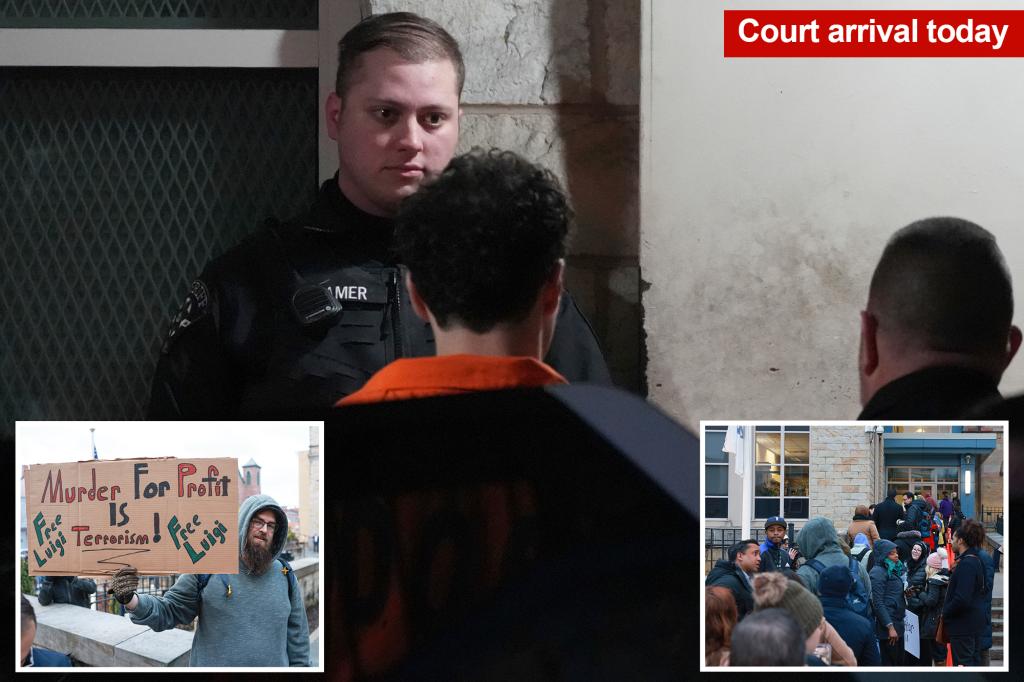The scene outside the Blair County Courthouse on Thursday was one of stark contrast and simmering tension. As Luigi Mangione, the 26-year-old accused of killing UnitedHealthcare CEO William McGuire, arrived for his extradition hearing, he was met not with condemnation or cries for justice, but with a chorus of support from an estimated 100 protesters. Their presence transformed the courthouse steps into a makeshift rally, a stage for airing grievances against the healthcare industry and championing Mangione as a symbol of their frustration.
The protesters, a diverse group united by their shared antipathy towards health insurance companies, brandished signs conveying their message. “Free Luigi” banners mingled with placards denouncing insurance practices, creating a visual representation of the protesters’ dual focus: supporting Mangione while simultaneously condemning the system they believe drove him to his alleged crime. One sign in particular, reading “Health Insurance Practices Terrorize People,” seemed to address the potential terror charges being considered by prosecutors, suggesting a link between Mangione’s actions and the perceived terror inflicted upon individuals by the healthcare industry.
This unexpected display of support for an alleged murderer raises critical questions about the public perception of the healthcare system in the United States. Are these protesters simply misguided individuals rallying behind a criminal, or does their demonstration reflect a deeper, more widespread discontent with the complexities and often-prohibitive costs associated with health insurance? The answer likely lies somewhere in the middle. While Mangione’s alleged actions cannot be condoned, the protesters’ frustration seems to stem from a legitimate place of pain and struggle within a system that many perceive as broken and unfair.
The protesters’ chosen slogans and signs reveal a narrative that paints Mangione not as a cold-blooded killer, but as a victim driven to desperate measures by a system they perceive as oppressive. The “Free Luigi” chants echo the sentiment that he was pushed to the brink, a victim of circumstances rather than a perpetrator of violence. The signs denouncing insurance companies further solidify this narrative, portraying Mangione as a representative of the countless individuals who feel exploited and trapped by the current healthcare landscape. This perspective, though extreme, provides a glimpse into the desperation and anger felt by some towards the healthcare industry.
The fact that this demonstration took place outside a courthouse, a symbol of justice and the rule of law, adds another layer of complexity to the situation. The protesters’ presence suggests a challenge to the traditional narrative of crime and punishment. By portraying Mangione as a victim, they are indirectly questioning the legitimacy of the legal proceedings against him, implying that the real culprit is the healthcare system itself. This blurring of the lines between victim and perpetrator, between justice and protest, underscores the deep-seated frustration and distrust towards the healthcare industry that fuels this unusual demonstration.
The protest in support of Luigi Mangione serves as a stark reminder of the deep divisions and anxieties surrounding healthcare in the United States. While his alleged actions should not be condoned, the protesters’ presence highlights a critical societal issue. Their demonstration, though radical in its support of an alleged murderer, reveals a profound sense of disillusionment and frustration with a system perceived by many as inaccessible, unaffordable, and ultimately, harmful. The protest transcends the individual case of Luigi Mangione, becoming a symbol of a broader struggle within the American healthcare system, a struggle that demands attention and solutions. This incident should prompt a deeper examination of the systemic issues that contribute to such widespread discontent and a renewed commitment to finding equitable and accessible healthcare solutions for all. The “Free Luigi” chants, though misguided in their support of an alleged criminal act, echo the cries of a population grappling with a complex and often-unyielding healthcare landscape.

